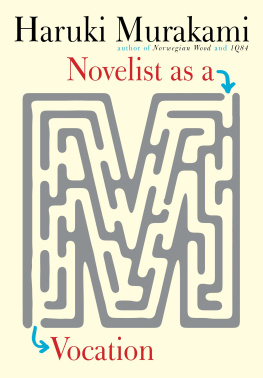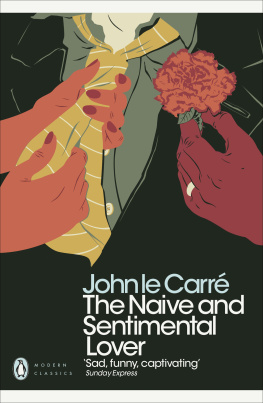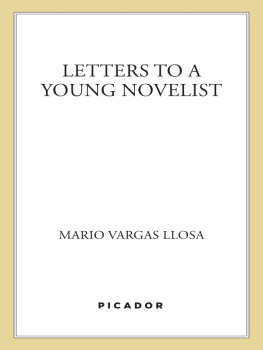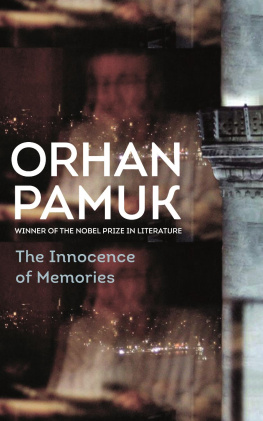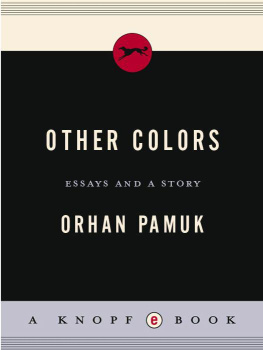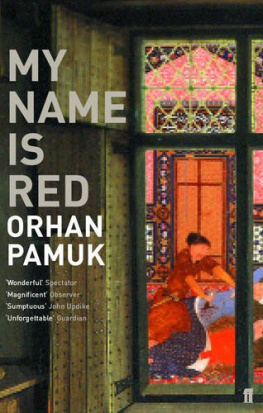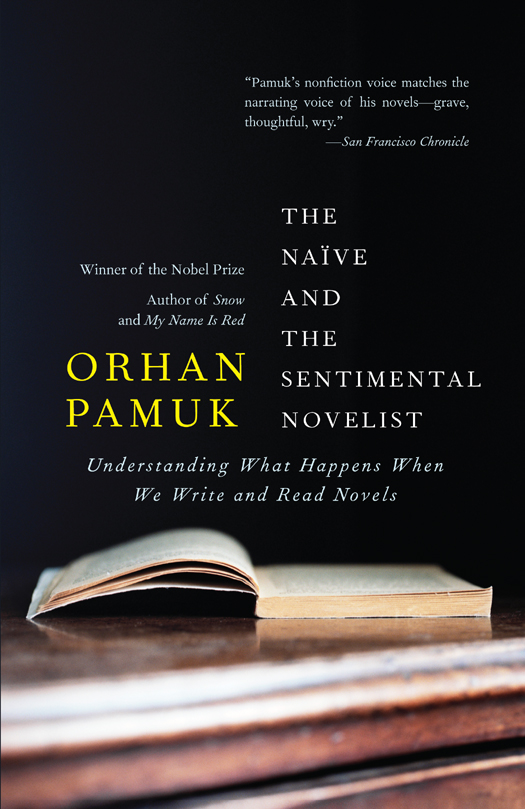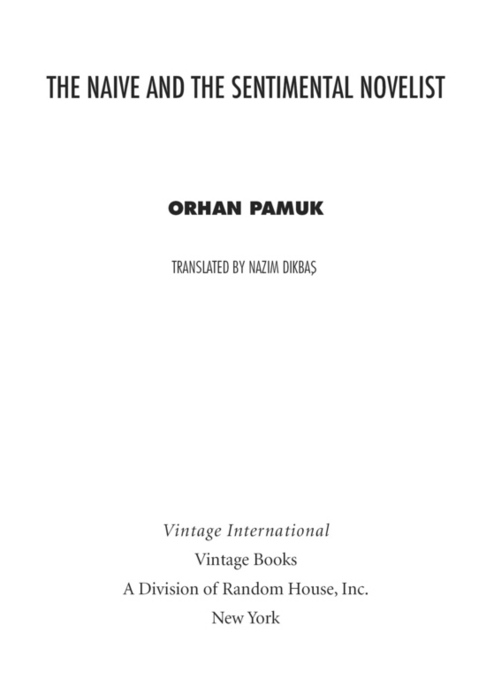Orhan Pamuk won the Nobel Prize for Literature in 2006. His novel My Name Is Red won the 2003 IMPAC Dublin Literary Award. His work has been translated into more than fifty languages. He lives in Istanbul.
Also by Orhan Pamuk
The Museum of Innocence
Other Colors
Istanbul
Snow
My Name Is Red
The White Castle
The Black Book
The New Life

FIRST VINTAGE INTERNATIONAL EDITION, NOVEMBER 2011
Copyright 2010 by Orhan Pamuk
All rights reserved. Published in the United States by Vintage Books, a division of Random House, Inc., New York, and in Canada by Random House of Canada Limited, Toronto. Originally published in hardcover in the United States by Harvard University Press, Cambridge, Massachusetts, in 2010. Reprinted by special arrangement with Harvard University Press.
Vintage is a registered trademark and Vintage International and colophon are trademarks of Random House, Inc.
Library of Congress Cataloging-in-Publication Data
Pamuk, Orhan, 1952
The naive and the sentimental novelist / Orhan Pamuk.
1st Vintage International ed.
p. cm. (The Charles Eliot Norton lectures ; 2009)
eISBN: 978-0-307-74525-5
1. Pamuk, Orhan, 1952 2. Authors, Turkish20th centuryBiography. 3. FictionHistory and criticism. 4. FictionTechnique. 5. Turkish literature. I. Title.
PL248.P34Z46 2011
894.3533dc22
2011007550
www.vintagebooks.com
Cover image Thom Atkinson / Gallery Stock
Cover design by John Gall
v3.1
To Kiran Desai
Contents
 What Our Minds Do When We Read Novels
What Our Minds Do When We Read NovelsNovels are second lives. Like the dreams that the French poet Grard de Nerval speaks of, novels reveal the colors and complexities of our lives and are full of people, faces, and objects we feel we recognize. Just as in dreams, when we read novels we are sometimes so powerfully struck by the extraordinary nature of the things we encounter that we forget where we are and envision ourselves in the midst of the imaginary events and people we are witnessing. At such times, we feel that the fictional world we encounter and enjoy is more real than the real world itself. That these second lives can appear more real to us than reality often means that we substitute novels for reality, or at least that we confuse them with real life. But we never complain of this illusion, this navet. On the contrary, just as in some dreams, we want the novel we are reading to continue and hope that this second life will keep evoking in us a consistent sense of reality and authenticity. In spite of what we know about fiction, we are annoyed and bothered if a novel fails to sustain the illusion that it is actually real life.
We dream assuming dreams to be real; such is the definition of dreams. And so we read novels assuming them to be realbut somewhere in our mind we also know very well that our assumption is false. This paradox stems from the nature of the novel. Let us begin by emphasizing that the art of the novel relies on our ability to believe simultaneously in contradictory states.
I have been reading novels for forty years. I know there are many stances we can adopt toward the novel, many ways in which we commit our soul and mind to it, treating it lightly or seriously. And in just the same manner, I have learned by experience that there are many ways to read a novel. We read sometimes logically, sometimes with our eyes, sometimes with our imagination, sometimes with a small part of our mind, sometimes the way we want to, sometimes the way the book wants us to, and sometimes with every fiber of our being. There was a time in my youth when I completely dedicated myself to novels, reading them intentlyeven ecstatically. During those years, from the age of eighteen to the age of thirty (1970 to 1982), I wanted to describe what went on in my head and in my soul the way a painter depicts with precision and clarity a vivid, complicated, animated landscape filled with mountains, plains, rocks, woods, and rivers.
What takes place in our mind, in our soul, when we read a novel? How do such interior sensations differ from what we feel when we watch a film, look at a painting, or listen to a poem, even an epic poem? A novel can, from time to time, provide the same pleasures that a biography, a film, a poem, a painting, or a fairy tale provides. Yet the true, unique effect of this art is fundamentally different from that of other literary genres, film, and painting. And I can perhaps begin to show this difference by telling you about the things I used to do and the complex images awakened within me while I was passionately reading novels in my youth.
Just like the museum visitor who first and foremost wants the painting hes gazing at to entertain his sense of sight, I used to prefer action, conflict, and richness in landscape. I enjoyed the feeling of both secretly observing an individuals private life and exploring the dark corners of the general vista. But I dont wish to give you the impression that the picture I held within me was always a turbulent one. When I read novels in my youth, sometimes a broad, deep, peaceful landscape would appear within me. And sometimes the lights would go out, black and white would sharpen and then separate, and the shadows would stir. Sometimes I would marvel at the feeling that the whole world was made of a quite different light. And sometimes twilight would pervade and cover everything, the whole universe would become a single emotion and a single style, and I would understand that I enjoyed this and would sense that I was reading the book for this particular atmosphere. As I was slowly drawn into the world within the novel, I would realize that the shadows of the actions I had performed before opening the pages of the novel, sitting in my familys house in Beikta in Istanbulthe glass of water I had drunk, the conversation Id had with my mother, the thoughts which had passed through my mind, the small resentments I had harboredwere slowly fading away.


